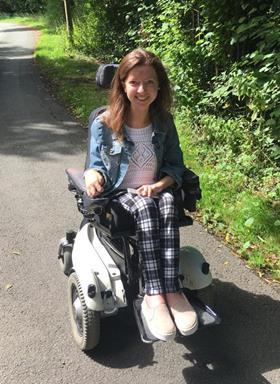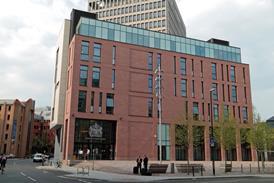Throughout the pandemic, the impact on disabled people has been largely overlooked. According to the Office for National Statistics, as of July 2020 almost two thirds of people who died from Covid-19 were disabled. The same report found that disabled women are 10.8 times more likely to die from coronavirus than their non-disabled peers, yet, this didn’t hit the headlines or spark universal outrage. People accepted it and moved on. But why?

I am a disabled person and I’ve been shielding for 10 months. I did not leave the front door of my flat at all for 130 days. I had a brief respite in August when I could go for walks but that’s it. No supermarkets, no visiting people, no meeting indoors or going to restaurants… And now, it’s back to not leaving the flat.
When the official advice around shielding eased, my own specialist doctor encouraged me to continue shielding for the foreseeable future and told me that 'under no circumstances can you get Covid-19 – if you end up in hospital, you will get cast aside as a second-class citizen'. Naturally, that filled me with confidence…
Outside of the disabled community, nobody talks about the impact of the pandemic on disabled people.
We had to lobby to receive critical care after a policy initially prevented disabled people dependent on others from receiving treatment. Given the shortage of ventilators, the National Institute for Health and Care Excellence (NICE) hastily issued guidance to medical professionals stating that decisions on access to critical care should be based on age and the critical frailty scale.
The latter inadvertently meant that disabled people, regardless of their age or health-status, would potentially be denied critical care. We had to fight to have our personal assistants/carers accompany us to hospital because of the ‘no visitor’ rule, even when that additional person is vital to our ability to function as an independent human. Some disabled people have been asked to sign DNRs (or been ordered them against their will and best interests).
Local authorities have been given the power to suspend their duties under the Care Act. Yet people seem so bemused when they ask why we are still so terrified and why we continue to shield.
Take a look at media coverage of coronavirus. It regularly reads along the lines of: ‘thousands dead but don’t worry, the majority had pre-existing medical conditions’. What message does that portray other than that disabled people’s lives are less valuable?
Even the use of the word ‘vulnerable’ creates a damaging narrative that dehumanises disabled people, painting a picture of an ‘other’, a passive victim without choice or control.
Disabled people are not inherently vulnerable. We are not a tragedy or a sob story. Society, instead, is placing us in situations that generate risk and don’t cater for us, the disabled community. We don’t need to be ‘fixed’, we are disabled by society. Society needs to change.
The pandemic has thrown challenges at everyone. It should have brought us all together, but disabled people have continued to be overlooked, cast aside, and treated as an afterthought.
Enough is enough. I hope the calls for an inquiry into the impact of the pandemic on disabled people shine a light on the blatant inequality in our society. And I hope that, one day, attitudes change.
Disability isn’t a bad word or something to be pitied. It’s an identity.
Lockdown has opened people’s eyes to what it’s like to be isolated or denied access to something. This is the norm for many disabled people because of the barriers in society.
I hope this newfound empathy will change the way we operate, make workplaces more accessible and inclusive, and encourage society to stop disabling us.
The most recent research from the Law Society and the Legally Disabled research team at Cardiff Business School looks in depth at the impact of Covid-19 on disabled members of the legal profession. You can read the full report here.
Millie Hawes is a senior corporate responsibility executive at Fieldfisher

















![David Lester (senior partner at Blythe Liggins), Darryl Barnes, Jagdeep Sandher (head of dispute resolution at Blythe Liggins)[4]](https://d1d8vslyhr7rdg.cloudfront.net/Pictures/274x183/4/2/8/116428_davidlesterseniorpartneratblytheligginsdarrylbarnesjagdeepsandherheadofdisputeresolutionatblytheliggins4_981603_crop.jpg)









No comments yet